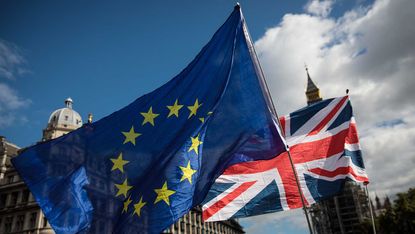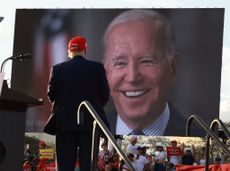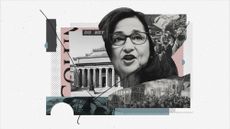What could a no-deal Brexit look like for the UK?
Talks back in the hands of negotiators after political intervention cannot break deadlock

The prospect of a no-deal Brexit has heightened after Downing Street said “very large gaps remain” between the UK and EU, despite a three-hour meeting between Boris Johnson and EU Commission President Ursula von der Leyen.
A No 10 spokesperson said that after a “lively and frank” dinner last night, talks will continue with a “firm decision” by Sunday.
“We understand each other’s positions,” said Von Der Leyden. “They remain far apart. The teams should immediately reconvene to try to resolve these issues. We will come to a decision by the end of the weekend.”
Subscribe to The Week
Escape your echo chamber. Get the facts behind the news, plus analysis from multiple perspectives.

Sign up for The Week's Free Newsletters
From our morning news briefing to a weekly Good News Newsletter, get the best of The Week delivered directly to your inbox.
From our morning news briefing to a weekly Good News Newsletter, get the best of The Week delivered directly to your inbox.
However, key sticking points remain. Johnson insists he cannot accept terms in a treaty that would tie Britain to EU rules, a “hugely sensitive” issue that has plagued negotiations, the BBC says.
Another hurdle is the EU’s demand for an “evolution” or “ratchet” clause to ensure that as one side upgrades its standards, the other is not able to enjoy a competitive advantage. Other issues such as fishing rights and dispute resolution also remain barriers to progress.
Financial News says the odds of a deal have now fallen from 64.5% on Monday to 43.4%.
Tariffs and quotas
If a deal can’t be agreed with the EU, then the UK will default to WTO terms from 1 January 2021. Every WTO member has a list of tariffs and quotas that they apply to other countries.
The UK would have to apply tariffs and quotas to goods coming into the country from the EU, and the EU would apply its “third-country” tariffs and quotas to the UK.
That means the UK would be hit by big taxes when it tried to sell products to the EU market. The bloc’s average WTO tariffs are 11.1% for agricultural goods, 15.7% for animal products and 35.4% for dairy.
British car makers would be hit with a 10% tariff on exports to the bloc, which could amount to €5.7bn per year. That would increase the average price of a British car sold in the EU by €3,000.
Currently, trade between the UK and EU is tariff-free. But the Confederation of British Industry (CBI) predicts that no-deal would mean that 90% of the UK’s goods exports to the EU would be subjected to tariffs.
Without a deal, it would have to trade with every WTO member in the world on the best terms it offered any member, including the EU.
Borders
In the event of no-deal, the EU would begin imposing border checks on UK products from 1 January 2021, even if the UK hadn’t changed any of its rules and regulations.
The UK government has admitted it expects massive border queues and persistent delays for six months or longer in the UK if it leaves without securing a deal.
France has said it plans to immediately implement post-Brexit border controls at its ports in the event of no-deal. The UK government has estimated that 50% to 85% of lorry drivers would not have the necessary documentation to enter the EU via France, says The Washington Post.
HMRC has estimated that British businesses would spend £15bn extra a year on paperwork in the event of a “no deal” Brexit, reports the Financial Times.
Economic impact
A small number of pro-Brexit economists say that most trade around the world is done on WTO terms, and the UK would still have access to the EU market, says Euro News.
But many other economists and academics say that crashing out and trading on WTO terms would be damaging for the British economy.
The head of the WTO has warned Johnson that standard trade terms “would slow Britain’s recovery from coronavirus, saying that sticking closer to present arrangements would be better for jobs”, The Times reports.
Roberto Azevedo, director-general of the WTO, said while WTO terms were “not a catastrophe”, they “will impose a number of adjustments and those can be painful, particularly for some sectors”.
The UK exports nearly half (46%) of its goods to the rest of the European Union, making it by far the largest UK export market. And over half (53%) of all UK imports came from the EU in 2018.
The UK’s economy relies heavily on its service industry, with British service providers making up 79% of the UK economy and accounting for 45% of exports. London’s position as a global financial hub would be threatened.
Non-EU countries
The UK crashing out of the EU with no deal at the end of 2020 isn’t just bad for UK-EU trade, it’s bad for UK trade full-stop, say some critics.
The UK could lose continuity of trade relations with many of the 72 countries that have trade deals in place with the EU, including Canada and Turkey.
Britain is in talks to continue its participation in those agreements, and has so far the government has secured continuity agreements with around a dozen countries.
No-deal would set the UK free from rule-taking
While a no-deal Brexit would mean the UK is no longer subject to EU rules, it would not mean that every rule the UK follows is made in the UK, says Full Fact.
“We would remain members of international organisations like NATO and the WTO, and membership of these things means following collective rules or decision-making,” says the fact-checking site.
And the UK will still be subject to the European Court of Human Rights after Brexit. This court isn’t an EU body, and the UK will still remain a member after the transition period ends.
Create an account with the same email registered to your subscription to unlock access.
Sign up for Today's Best Articles in your inbox
A free daily email with the biggest news stories of the day – and the best features from TheWeek.com
-
 Cicada-geddon: the fungus that controls insects like 'zombies'
Cicada-geddon: the fungus that controls insects like 'zombies'Under The Radar Expert says bugs will develop 'hypersexualisation' despite their genitals falling off
By Chas Newkey-Burden, The Week UK Published
-
 'Voters know Biden and Trump all too well'
'Voters know Biden and Trump all too well'Instant Opinion Opinion, comment and editorials of the day
By Harold Maass, The Week US Published
-
 Is the Gaza war tearing US university campuses apart?
Is the Gaza war tearing US university campuses apart?Today's Big Question Protests at Columbia University, other institutions, pit free speech against student safety
By Joel Mathis, The Week US Published
-
 Is David Cameron overshadowing Rishi Sunak?
Is David Cameron overshadowing Rishi Sunak?Talking Point Current PM faces 'thorny dilemma' as predecessor enjoys return to world stage
By The Week UK Published
-
 'Europe is now beginning to tackle its military to-do list'
'Europe is now beginning to tackle its military to-do list'Instant Opinion Opinion, comment and editorials of the day
By Harold Maass, The Week US Published
-
 Will Aukus pact survive a second Trump presidency?
Will Aukus pact survive a second Trump presidency?Today's Big Question US, UK and Australia seek to expand 'game-changer' defence partnership ahead of Republican's possible return to White House
By Sorcha Bradley, The Week UK Published
-
 Can Boris Johnson save Rishi Sunak?
Can Boris Johnson save Rishi Sunak?Today's Big Question Former PM could 'make the difference' between losing the next election and annihilation
By The Week UK Published
-
 It's the economy, Sunak: has 'Rishession' halted Tory fightback?
It's the economy, Sunak: has 'Rishession' halted Tory fightback?Today's Big Question PM's pledge to deliver economic growth is 'in tatters' as stagnation and falling living standards threaten Tory election wipeout
By Harriet Marsden, The Week UK Published
-
 Stormont power-sharing in sight: 'good news' for Northern Ireland?
Stormont power-sharing in sight: 'good news' for Northern Ireland?Talking Point Unionists vote to end two-year boycott after agreeing legislative package to address post-Brexit trading arrangements
By The Week UK Published
-
 Why your local council may be going bust
Why your local council may be going bustThe Explainer Across England, local councils are suffering from grave financial problems
By The Week UK Published
-
 Rishi Sunak and the right-wing press: heading for divorce?
Rishi Sunak and the right-wing press: heading for divorce?Talking Point The Telegraph launches 'assault' on PM just as many Tory MPs are contemplating losing their seats
By Keumars Afifi-Sabet, The Week UK Published